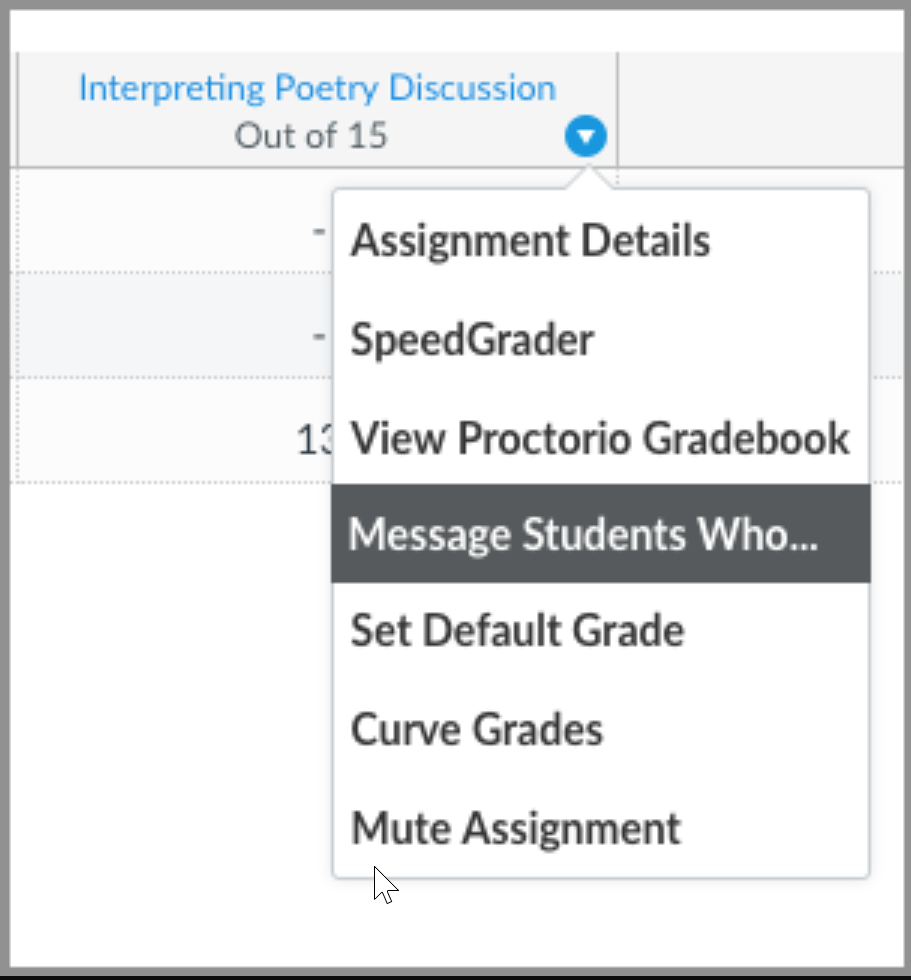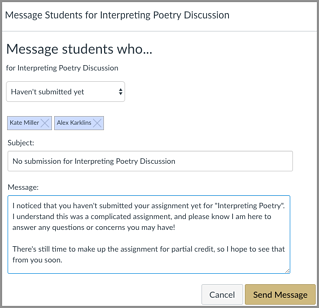Motivating Students Online: Gradebook Tools for Connecting with Students
This is the first in a series of posts, intended to provide actionable Canvas strategies that instructors can easily implement to help improve motivation and engagement among online students.
Students often feel isolated in online courses, and crave the connection with peers and instructors that occurs more naturally in the face-to-face environment. While students of course have a responsibility to take charge of their own learning strategies, there are certain strategies that you, the instructor, can implement to help students feel more engaged and motivated, and ultimately become more successful in their online learning.
One of the key online strategies you can use as an instructor is to connect with students through individualized communication. While you likely do this already through email or inbox messages, you may not have known that the Canvas Gradebook provides some handy tools at your disposal for time-saving communication.
Canvas Gradebook: More than just grades
Did you know you can use Gradebook features to send targeted messages to your students? What’s more, you can tailor messages to students who meet certain criteria for a particular assignment. In other words, you have the ability to send direct messages to students who:
- Haven't submitted yet—students who haven't submitted the assignment.
- Haven't been graded—students whose assignments have not yet been graded (submitted or unsubmitted).
- Scored less than [point value]—students who earned a grade on their assignment less than X number of points.
- Scored more than [point value]—students who earned a grade on their assignment more than X number of points.
When you use this feature, a single message is sent to all students in the selected category. You can be assured, however, that each student will receive an individual message.
Get Started with “Message Students Who…”
The most helpful tutorial for using this feature can be found in the Canvas Guides: How do I send a message to my students from the Gradebook?
In a nutshell, open the course gradebook and hover your cursor over the assignment, and click on the small dropdown arrow. Select the option to “Message Students Who…”, and proceed from there with the options provided.

Finally, don’t underestimate the importance of the tone of your message! Communicating with students in a personable way demonstrates that you are a partner with them in their learning process. Encouragement, helpful suggestions, and openness can go a long way.

The Benefit for Instructors and Students
How does this simple trick benefit both you and your students? First, this tool allows you to connect with students who haven’t submitted an assignment immediately after the due date (rather than waiting until you’re in the process of grading, and messaging students one-by-one). It also allows you to easily connect with students who have fallen behind, letting them know that you’re still there as a support and guide. Finally, it gives you an easy way to congratulate students who have scored above a certain threshold, giving them motivation for continued excellent work!
If you have any questions about using this tool in Canvas or best practices, please contact CU Online.
Key Resources
Broadbent, J., & Poon, W. L. (2015). Self-regulated learning strategies & academic achievement in online higher education learning environments: A systematic review. Internet and Higher Education, 27, 1–13.
Ryan, R.M., & Deci, E.L. (2009). Promoting self-determined school engagement: Motivation, learning, and well-being. In K. R. Wentzel & A. Wigfield (Eds.), Handbook of motivation at school (pp. 171-195). New York, NY: Routledge.
Sansone, C., Fraughton, T., Zachary, J. L., Butner, J., & Heiner, C. (2011). Self-regulation of motivation when learning online: the importance of who, why and how. Educational Technology Research and Development, 59(2), 199–212. https://doi.org/10.1007/s11423-011-9193-6
Zimmerman, B. J. (1990). Self-regulated Learning and academic achievement: An overview. Educational Psychologist, 25(1), 3–17.







Add new comment